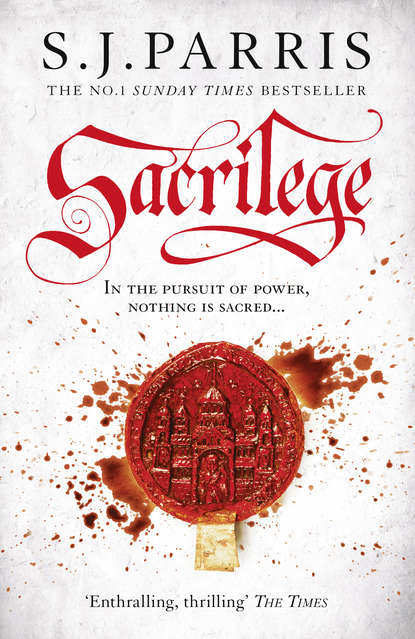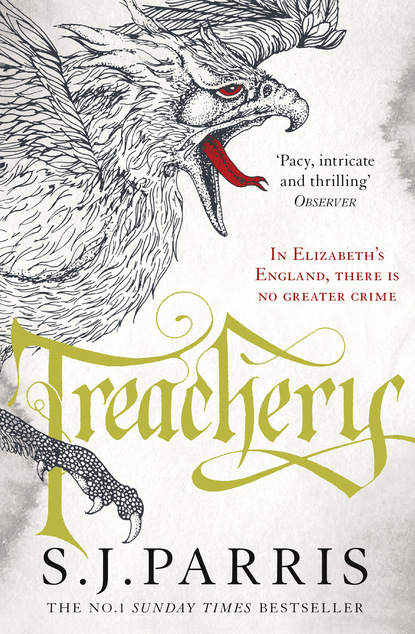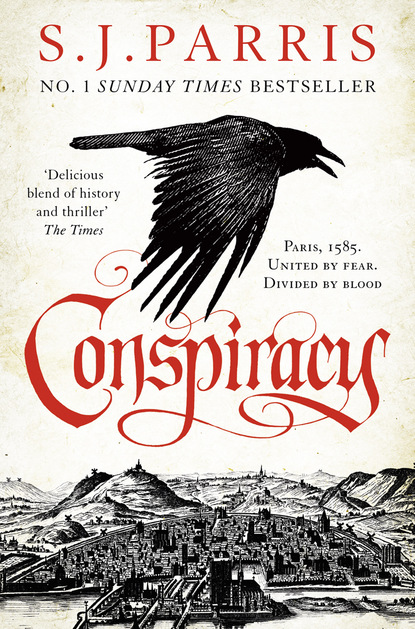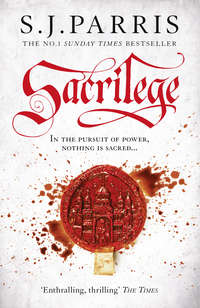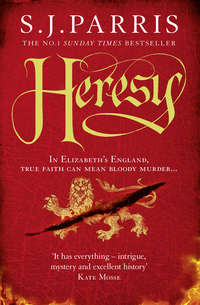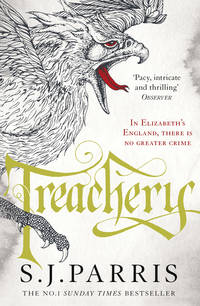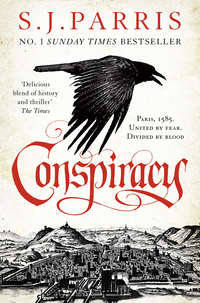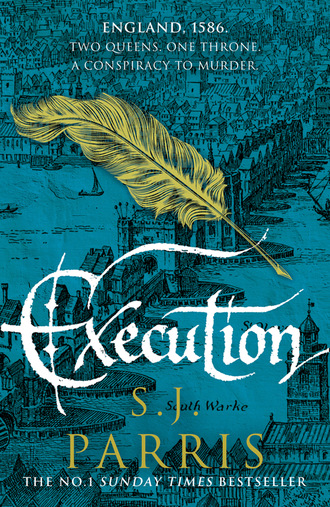
Полная версия
Execution
I laughed. ‘Master Gifford – you confided your most secret plans to a woman in order to impress her. That is always a mistake.’
He nodded, understanding. ‘Of course. Mary Gifford. My so-called relative in Paris. I suppose she was spying for him too?’ He jerked his head towards Phelippes, who continued to sort his papers into piles on the desk.
‘In fact, the girl was not in our employ, though I wish she had been,’ he remarked, without looking up. ‘She delivered better intelligence than half the men we have in Paris.’
I glanced at him; I wanted to steer Phelippes away from the subject of Mary Gifford, the young woman who had worked as a governess in the English household where Gilbert had lodged in Paris, lest he take too much interest in her abilities, and her history.
‘You should be grateful to her, Gilbert,’ I said. ‘From what I hear, your cargo was not well concealed. If your arrival had not been expected you would have been caught anyway, and you would have joined your father in prison. As it is, you both enjoy your liberty, and now you have useful employment.’
‘So I should consider myself in your debt?’ He tilted his chin and fixed me with a challenging look.
‘You should not consider me the architect of your misfortune, at any rate,’ I said, stretching out the ache in my back. ‘What was your life in Paris? Moping about bemoaning the loss of your family’s estate and waiting for a scrap of attention from Paget, who cared more about the letters you carried than he ever did about your safety. Now you are writing yourself into history. Think on that.’
He squinted as he attempted to work out if I was serious. ‘Not the way I wanted,’ he said, more soberly. ‘All I do is ride back and forth to Staffordshire on filthy roads, for a deception I am ashamed to—’ He broke off, casting a glance at our host and evidently thinking better of his words.
‘If you must keep talking, you will have to go next door,’ Phelippes said. ‘I have work to do.’
‘It’s the middle of the night, man,’ I said. ‘Are you not half-mad with tiredness? I know I am.’ It seemed weeks since I had set out from Rye, though it was only first light the day before.
Phelippes raised his head, surprised. ‘No. If you want to sleep, take my bed.’
‘Where will you sleep?’
‘He never sleeps,’ Gifford said, with a touch of bitterness. I guessed that part of the reason for his accommodation here was so that Phelippes could report back on his movements. I wondered if I would be subject to the same scrutiny. I believed Walsingham had faith in me, but perhaps he never fully trusted anyone. I would not either, in his position.
Gifford and I moved through to the bedchamber, where he flopped on the pallet without undressing, hands folded across his stomach, staring at the ceiling.
‘I suppose you were in love with her too,’ he said, after a while, as I took off my doublet and laid it at the foot of Phelippes’s bed. ‘Mary Gifford, I mean. If that was even her real name.’
I sat down to pull off my boots. ‘No, I was not in love with her.’ This was a lie, but there was no need for him to know that. Her real name was Sophia Underhill, but that was not his concern either.
‘I thought I was,’ Gifford said, with unexpected candour. ‘Now I know it was not love – only a mere shadow of the real thing.’ A dreamy smile played at the corners of his mouth. I set my boots down and leaned forward to look at him.
‘You have found the real thing, then?’ I asked, keeping my voice casual.
His eyes darted sideways at me and his expression hardened. ‘If I had, I would not speak of it to you – you would run straight to tell Walsingham for the chink of a couple of groats in your purse.’
‘Why, is it something Walsingham should know of?’
A deep colour spread instantly over the boy’s face, displacing even the flush of drink. ‘No. I mean to say – I have nothing to hide from him. But some things I may keep private. He is not master of my affections, though he may have bought my service.’
‘Well, whoever has command of your heart now must be a rare beauty, if she has displaced the lovely Mary Gifford in your eyes.’ I leaned back on the bed, not looking at him, hoping an offhand manner would invite further confidences.
He met this with a pointed silence, continuing to stare at the ceiling. I turned my back to him and began to unlace my shirt, feigning a lack of interest.
‘Her beauty is not so cheap as shows only in a glass,’ he burst out, eventually. ‘It also shines in her nobility of birth and character. Though, I confess, she has been blessed by nature too.’
I smiled to myself; in my experience, a young man will always find a way to boast of his conquests, even when he knows better.
‘She is a lady, then?’
‘The granddaughter of an earl, and serves the Queen herself in her bedchamber. Mary Gifford is nothing but a governess. I am not convinced we are even related. My father never heard of any branch of the family from Somerset.’
‘How did you meet this noble beauty?’ I asked, to prevent any further speculation on Mary Gifford’s identity. ‘The Queen keeps her women close, I thought?’
He seemed on the point of answering, but somewhere behind the haze of drink and infatuation, a note of caution sounded; I saw his eyes sharpen. ‘I will think twice before I tell you anything, Giordano Bruno. Paget warned me about you. I know you for a heretic.’
‘Well, my soul is no business of yours, Gifford, but we serve the same earthly master now, so we will have to get along a little better. Give you good night.’ I leaned over and blew out the candle. If I were to agree to Walsingham’s absurd scheme – and I had not yet given any undertaking, though he seemed to have assumed my willingness – there would be time enough to win Gifford over. I pulled the blanket around my shoulders and allowed the exhaustion of the past two days to fall on me. The creak of boards carried from the adjoining room as Phelippes moved around, about his secret work of symbols and ciphers, saving the realm. I was about to tumble over the edge of sleep when Gifford shifted on his pallet and yawned.
‘She came back to London, you know. Mary Gifford, I mean.’
I pushed myself upright instantly. ‘What? When?’
He gave a soft laugh. ‘What is it to you? I thought you were not in love with her.’
I ignored this. ‘She spoke to me of returning to London, but in a year or so, she said. Do you know different?’
He stretched out his limbs, enjoying this small power. ‘Perhaps she grew impatient. Before I left at Christmas, she had asked Paget to write her a letter of recommendation to a family he knew in London, to serve as a lady’s companion.’
‘And did he? What was the family’s name?’
‘I will have to see if I can recall. Give you good night, Bruno. Sleep well.’
I could hear the smile in his voice as he turned over. I called him a son of a whore under my breath in Italian and flung myself back on the bed, all thoughts of sleep banished. Moonlight slanted through the narrow casement; I stared at the patterns it cast on the wall while I considered that Sophia Underhill, the woman who had troubled my dreams in all her various names since I first encountered her in Oxford three years ago, might be out there somewhere in the same city, perhaps only streets away. I turned on to my side, and heard a furtive rustling from Gifford’s pallet, a sound I knew all too well from years confined as a Dominican friar; the boy was furiously frotting himself, no doubt thinking of his new love’s noble character. Madonna porca. I was too old to be sharing a bedchamber with worked-up boys. I rolled on my back and recalled my last meeting with Sophia in Paris, when she still called herself Mary Gifford. She had fled to France to escape the law in England, but she had always meant to return; she had left behind a child, taken from her at birth because she was unmarried, but she had not given up her dream of finding him again. If she had hastened her return to London, it could only mean she had received news that gave her reason to hope. If I could see her, perhaps I could be of use to her in her quest. Then I remembered that, if I stayed in London, it would be as a Spanish Jesuit and my time would be taken up conspiring to regicide; it would be all but impossible for me to see anything of Sophia in that guise. Even so – if Gifford was telling the truth, her presence here was another reason to consider staying.
The boy made a noise like a strangled fox as he finished and was snoring within minutes. I lay awake, staring at the ceiling, wondering if any of the possible rewards of this business would be worth the price.
The next day I woke early, blinking into a chilly light, aches deep in my shoulders and thighs from two days in the saddle. Gifford lay sprawled on his pallet, twitching in dreams like a dog, but I could hear low voices from the adjoining room, so I splashed water over my face and quietly pulled on my clothes, thinking Walsingham must have come for my answer. Instead I approached the half-open door to hear Phelippes in hushed conversation with a tall man who had his back to me. I could see only that he was dark-haired and wore a rust-brown leather jerkin patched on the shoulders.
‘Master Secretary mentioned nothing about this last night,’ Phelippes was saying, his voice impatient.
‘I have just now come from Seething Lane,’ the stranger said, in an accent that sounded to my ears like that of the London boatmen. ‘The Italian is to come with me to Southwark.’
‘This makes no sense. Why would Master Secretary send him poking about the scene of the death in broad daylight, when the killers may be watching the place to see precisely who comes asking questions? And you, Master Poole – I would have thought you were the last person—’
‘Perhaps you don’t know his every thought, Thomas.’ The newcomer’s voice was tight. ‘Master Secretary wants the Italian’s view on the business. Don’t ask me why – I didn’t question it. But he did say for him to cover his head with a hat and his face with a kerchief. And tell him not to shave.’
‘Does he decide the length of my beard now?’ I said, pushing the door open. Phelippes glanced up without surprise; he was still sitting behind his desk making notes on his papers as I had left him, and it was impossible to tell from his face whether he had been there all night. The tall man turned and I saw that he was in his early thirties, good-looking in a dishevelled way, with a strong jaw and thick eyebrows that met in a V above his nose. It seemed from a soreness around his eyes that he had cried recently, or perhaps it was only the dust of the streets.
Phelippes waved a hand at him. ‘Doctor Bruno, this is Master Robin Poole, supposedly come from Seething Lane to conduct you to Southwark, though I am not persuaded this is a good use of your time.’
Robin Poole met my look and rolled his eyes in what I took as a complicit comment on Phelippes and his blunt ways. So this was the brother of the dead girl, the one who wanted to run her alleged killers through without waiting for evidence. Though his face appeared open, I could not help but concede that Phelippes might be right; it seemed unlikely that Walsingham would send this man to investigate the murder of his own sister. Master Secretary distrusted anyone who could not keep a tight rein on their emotions, especially when engaged on his business, and a man in the throes of grief was not the best judge of his own actions. I inclined my head and waited. He thrust his hand out and I shook it in the English fashion.
‘Giordano Bruno.’
‘I know. You are to come with me, but cover your face. I have a horse outside.’
I glanced at Phelippes. ‘On what business?’
Impatience flashed across Poole’s eyes, but he kept his countenance. ‘I will brief you on the way. Master Secretary wants your view of things.’
‘What things?’ If Walsingham had given these orders, he must have a purpose. Perhaps he had considered it wise to let Poole feel he was playing some active part in the investigation, but wanted me there to ensure he didn’t blunder.
‘You ask a lot of questions. This murder.’ Muscles tensed along his jaw, but his voice remained steady. ‘He says you have a trained eye.’
I thought I caught a note of scepticism, but perhaps that was my imagination. I gave a brisk nod.
‘Is there anything to eat?’
Phelippes sniffed. ‘This is not an inn, Doctor Bruno. Ask Master Poole if you wish to break your fast on the way, he claims to have your needs in hand. I hope you are not being dragged on a fool’s errand. We have little time to lose as it is – the girl’s death has disrupted everything.’
Poole held the door for me, raising his eyebrows again to make clear his feelings about Phelippes. When I joined him on the stairs with a hat pulled down over my ears and a kerchief tied around the lower half of my face, he gave me a cursory glance of approval and signalled for me to follow him. I noticed that he walked with a slight limp in his right leg. He didn’t speak until we were outside, where a boy with scabs on his lip held an old but solid-looking grey mare by a rope halter.
‘You’ll have to ride behind me.’ Poole pulled himself into the saddle with an easy, practised movement that almost disguised the way he nudged his right leg over subtly with his hand. I climbed up behind him, wincing at my aching muscles. He slipped the boy a coin and we turned out of Leadenhall down Gracechurch Street towards London Bridge.
‘There is something wrong with that man,’ he said, after a while, as if challenging me to disagree.
‘Phelippes? He is unusual, I grant. But I have studied the art of memory for nearly twenty years and only ever met one other with natural faculties like his.’
Poole grunted. ‘I still say he is touched. The man behaves as if he has never known a human feeling. Mark how he spoke of my sister, as if her death is no more than an inconvenience. And he believes Master Secretary can’t scratch his arse without he, Thomas, weighs up the cost and stamps five papers to approve it.’
I laughed, though I was not sure if it was intended as a joke, but I felt him relax. ‘I’m sorry for your loss,’ I said, as we passed down New Fish Street with the great gatehouse arch of the bridge in sight. The streets were already busy with traders’ carts, and goodwives on their way to market, baskets jutting from their hips. Gulls wheeled overhead, loosing lonely cries. The air was cold, carrying the dirt smell of the river on a sharp breeze.
‘She should never have been caught up in this,’ he replied, after a long pause. ‘Clara was an innocent, Doctor Bruno. She was not cut out for living a double life, the way we learn to in Walsingham’s service. Women are too much led by their feelings to dissemble in that way.’ He fell silent again and a shudder rippled across his back as he exhaled. I could have told him then that I had met plenty of women as skilled in the arts of duplicity as any man, and every bit as determined – I thought again of Sophia Underhill – but it was not the moment.
‘You blame Walsingham, then?’
‘It would be meaningless to blame him,’ he said, after a moment’s pause. ‘Clara volunteered for this work. She was tired of a life indoors, a poor widow marking time to become a governess. She sought adventure. Now see where that has led her – pushing her way into a man’s world.’ He seemed about to say more, but fell silent abruptly. I wondered how much detail Walsingham had told him about the manner of her death. Poole made it sound as though he partly blamed his sister for her own end.
‘Then it was her idea, to become close with the conspirators?’
His shoulders tightened. ‘She only thought of carrying letters or something in that line. She badgered Walsingham to give her a task – he said he had enough couriers. I think he had misgivings, rightly, about trusting a woman with sensitive correspondence. But if the fault for her death lies with anyone, I must own it.’
‘How so?’
He glanced to the side, wrinkling his nose as we approached Fish Wharf and the Fishmongers’ Hall on the north bank of the river and the smell assaulted us from all sides. He dropped his voice, so that I had to lean forward to hear.
‘Babington and his friends keep themselves close, as you’d expect. They do not lightly confide in outsiders – you’ll find this out for yourself soon enough, though Master Secretary seems to believe you will walk into their open arms without hindrance.’ His tone let me know what he thought of Walsingham’s faith, though I chose not to take it personally. ‘They found me useful because they believed I brought them information about Walsingham, but my connection with him also made them wary, even though I have been working to gain the trust of the Catholics in London for years now. I was brought to the conspirators by Jack Savage, who I met in prison when I was serving time for distributing illegal books. But they still didn’t invite me to their most private meetings. Walsingham grew frustrated with the lack of progress, though no more than I was with myself. Once I made the mistake of remarking to him that, with a man like Babington, a woman might have better luck drawing out his secrets. It never occurred to me that he would think to use my sister.’
‘Then it was Master Secretary’s idea to have her introduced to them?’
‘It could have been Clara’s. She would have thought it good sport.’ He sighed. ‘My sister was a beautiful girl, Bruno. I wish you could have seen her. Long, red curls down her back, and white skin – people said she looked like the Queen herself when she was a young princess. I don’t suppose she ever intended to do any more than flirt with them, see what they would confide. I didn’t like the idea, but Walsingham overruled me.’
‘You could not have known how it would end.’
‘I should have guessed, and put my foot down. I knew what those men were like, I’d seen what they were capable of. And Clara was soft-hearted. She married a man with no money because he won her with pretty words. She should never have gone near the like of Babington and his friends. Our father would spin in his grave. God knows when I shall even be permitted to bury her.’
‘You have not seen her?’
‘He won’t let me, yet. Says it’s vital her death does not become public knowledge too soon, the better to allow her killers to betray themselves.’ He shook his head and his voice took on a dark edge. ‘That’s what makes me think he is keeping something from me.’
He left an expectant pause but I said nothing, and we rode on in silence, passing through the north gatehouse of London Bridge. A young man hung limply by his wrists in the pillory, glazed eyes barely noting the passers-by, who were too caught up squeezing through the archway to pay him any heed. It was only as we drew level that I realised it was a girl dressed in men’s clothes, her hair cut short, her face grey with fatigue.
‘What’s her offence, do you think?’ I asked Poole, leaning forward.
He gave her the briefest glance. ‘She’ll be a whore from the Bankside stews,’ he said, as if this were an everyday sight. ‘Some of them dress as boys for the clients. It’s prohibited. If they’re caught, it’s a few hours in the pillory.’
The girl looked up at me from under her hooded lids, her expression neither pleading nor defiant, and I recalled the day Sophia Underhill had come looking for me disguised as a boy to escape a charge of murder. I wondered again where she might be, and whether her current identity as Mary Gifford was any more comfortable to her. If Gilbert Gifford insisted on playing games about how to find her, I was quite prepared to threaten it out of him.
Our progress slowed as we joined the flow of traffic making its way along the narrow conduit, barely twelve feet across, between the houses crammed each side of the bridge. Carts, wagons, horses and people on foot hoisting baskets or children on their shoulders were forced into a laborious shuffling procession, one lane in each direction, accompanied by cursing and shoving as those in a hurry tried to push ahead, only to be forced back, sometimes with blows, by people in front determined not to give way. The stink of horseshit rose as we inched forward; I took a deep breath through the kerchief and considered that, in my eagerness to return to London, I had forgotten how much I resented trying to get around the place.
‘Where are we going?’ I shouted at the back of Poole’s head, as the horse flicked its ears, impatient at the throng milling about its legs.
‘To search the place she was found.’
‘Has that not been done already? It was two days ago, I thought.’
He made a scornful noise through his teeth. ‘I wouldn’t trust the London constables to search their own breeches and find their cocks.’
‘And what are we looking for?’
‘We’ll know if we find it.’
I let this cryptic answer hang for a moment.
‘This will be a difficult task for you,’ I said, when he made no move to continue the conversation. The muscles across his back stiffened.
‘Who has suggested that?’
‘I mean only that you cannot be impartial.’
‘None of us is impartial, in this business.’ He allowed a pause. ‘Oh, I see. They have told you I will blunder in and mar the project, because I cannot contain my grief. Who said that, Phelippes?’
‘No one has said so.’
He glanced back over his shoulder. Even in quarter profile I could see his scorn. ‘How long have you been in the Service?’
‘For Walsingham? I met him in the spring of ’83, shortly after I arrived in England.’
‘Three years, then. Though you have been out of the country since last autumn, I understand.’ He sounded pleased, as if he had won an argument. ‘I have served him twelve, since he was first appointed to the Privy Council.’
‘What is it you do for him, exactly?’
‘I talk to people.’ He set his eyes ahead so that I could not see his face, but I could tell from his voice that he was smiling. ‘Listen, I’ve been in prison three times for his sake, once for two months, and given no special treatment that would mark me out as his man. I took my beatings like the rest of the papist suspects, and my knee has never fully recovered.’ He slapped his right leg, hard, as if to punish it. ‘If I did not betray myself then, I will not now, any more than you will.’
‘I meant no offence,’ I said hastily. ‘Only that I have never lost a sister – I do not know that I could keep my countenance in your position.’
‘I think you are disingenuous, my friend.’ But he sounded mollified. ‘If he thought you could be ruled by your emotions or betray yourself so easily, he would not have chosen you. For myself, I must put grief to one side. I know how to do that well enough. Sister or no sister, she was a pawn in a chess game played for high stakes, and I intend to find out who took her.’
I felt his metaphor was flawed, though I resisted pointing this out. He appeared to have assumed a responsibility for investigating Clara Poole’s death that I suspected did not come from Walsingham, and again I wondered at Master Secretary’s motive in involving him.
‘Tell me of this Babington group, then,’ I said, to channel his anger. ‘What kind of men are they? Besides ruthless.’
He let out a bitter laugh. ‘Walsingham insists on giving the business Babington’s name, since Babington’s money is furnishing the plans and he wants the glory. They should more properly call it the Ballard plot. That priest is the dangerous one among them. Him, I would call ruthless. Next to him, Babington is a mere fop. A pretty, rich boy looking for adventure. He wanted a cause, and in Mary Stuart he has found one. And the others can’t proceed without his money, so he is flattered and made to feel important.’
‘You think Babington’s faith is not sincere?’
‘Oh, he believes absolutely in his own sincerity, and the idea of himself as the saviour of England. But I don’t think he gives two shits for the sufferings of ordinary English Catholics. His father left him a thousand pounds a year, what would he know of hardship?’


